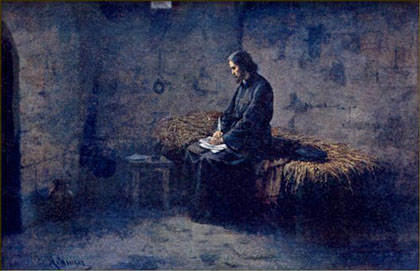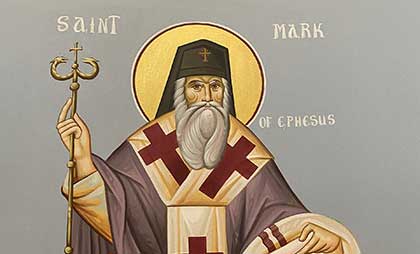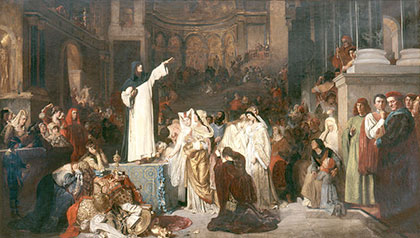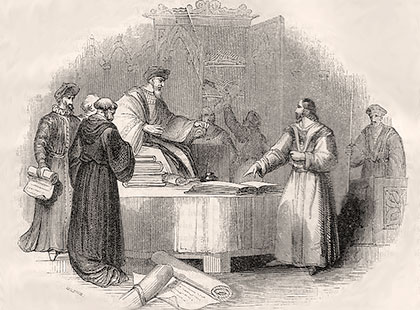
[ABOVE—Hus in a damp and dark prison writes his last message to the Czechs, by Josef Mathauser [Public domain], via Wikimedia Commons]
John Hus, who would die for reform after a cruel imprisonment, cared nothing for talk of reform when it first came to Bohemia. But somehow or another God touched his heart and impressed him with the truth of much that the reformer Wycliffe had written. Wycliffe’s work had reached Bohemia owing to a marriage which linked the two nations. Hus was open to Wycliffe’s religious influence because he already admired the English scholar’s philosophical writings.
A priest and scholar in 15th-century Bohemia,
John Hus was a reformer 100 years before Luther. After a lengthy and cruel imprisonment, he was burned as a heretic for his uncompromising belief in the authority of the Bible. This DVD has won awards.

Following his change of heart, Hus became zealous for Christ. This led to his death on trumped up charges. Because he accused churchmen of grave sins and showed that the church had strayed from biblical teaching, he fell afoul of hypocritical religious authorities.
Hus was invited to the great council of Constance, which ousted three popes and made a new one. Promised safe conduct by the emperor, he was instead imprisoned and subjected to an unfair trial. As with Joan of Arc, he had to stand alone in his own defense, attacked by a host of learned and antagonistic clergy, and barely allowed to open his mouth in reply to their accusations. Little wonder then that he was burned on false testimony. The council pretended he held views which he clearly did not. Martin Luther, examining his life and letters a century later wrote,
Should any man read [Hus’ ] letters, or hear them read, being, at the same time, in possession of a sound intelligence, and, in the face of God, having a regard for his own conscience, he will not, I am convinced, hesitate to allow that John Huss was endowed with the precious gifts of the Holy Spirit. Observe, in fact, how firmly he clung, in his writings and his words, to the doctrines of Christ; with what courage he struggled against the agonies of death; with what patience and humility he suffered every indignity; and with what greatness of soul he at last confronted a cruel death in defence of the truth—doing all these things alone and unaided, before an imposing assembly of the most powerful and eminent men, like a lamb in the midst of wolves and lions. If such a man is to be regarded as a heretic, no person under the sun can be looked on as a true Christian. By what fruits, then, shall we recognise the truth, if it is not manifest by those with which John Hus was so richly adorned?
When Hus was martyred, his native Bohemia revolted from Rome and developed an independent church. Crusades and armies marched against the nation, but with little success. The Bohemian church was independent of Rome for over 200 years.
Hus’ preaching was centered in Bethlehem chapel. The following letter was written during his imprisonment, and the Bethlehem chapel figures prominently in it.
Excerpt from a Letter to Peter Maldoniewitz Describing a Dream
Explain this night’s dream. I thought they wanted to destroy, at Bethlehem, all the representations of Christ, and that they destroyed them. The next morning, on rising, I saw many painters, who were painting finer and more numerous images. I looked at them with joy: the painters said, with the crowd— “Let the bishops and priests come now, and let them endeavour to destroy these designs!” Upon this, great multitudes rejoiced at Bethlehem, and I with them; and on awaking, I found that I was laughing.
In the following letter, one of the last Hus wrote, (St. Peter’s Festival is in late June; he was executed a couple weeks later, early in July), Hus describes truth as triumphant. His words became the basis of the Czech national motto: “Truth Prevails.”
John Hus to the University of Prague
Honorable Masters, bachelors, and students, of the University of Prague, you whom I cherish in Christ Jesus, I exhort you all to love one another, to extirpate schism; to honor God above all things; in reminding yourselves how much I have always desired that the progress of our University should turn to the glory of God; how much I have bewailed your discords and your violence, and how I have always endeavored to maintain united our illustrious nation. Remember also how much my life has been embittered by the outrages and blasphemies of some amongst those whom I most loved, and for whom I would willingly have exposed my life. And now they inflict on me a cruel death? May the Almighty God forgive them, for they know not what they do; and I pray with a sincere heart that he may spare them! My well beloved in Jesus Christ, dwell in the truth that you have known, which triumphs over all, and which increases in strength even unto eternity.
Know, also, that I have neither revoked nor abjured any article. The Council wished that I should acknowledge as false and erroneous all the articles extracted from my books. I have refused, unless they proved to me their falsehood by the Scriptures. If there is really some erroneous meaning in these articles I detest it, and refer its correction to our Lord Jesus Christ, who knows my sincerity, and is aware that my intention is not to maintain an error. And all of you likewise do I exhort, in the Lord, to detest every error that you may discover in my works; but in respecting that truth, which I have ever kept in view, pray for me, and support each other in the peace of God.
I, John Hus, in chains, and already on the verge of the present life, awaiting to-morrow a cruel death, which, I hope, will wash away my sins, not finding in myself any heresy, by the grace of God, confess with all my soul the truth in which I believe.
Written five days before the Festival of St Peter. I conjure you to love Bethlehem, and to put Gallus in my place; for I think the Lord is with him. I recommend to you Peter de Maldoniewitz, my very faithful and courageous comforter.









